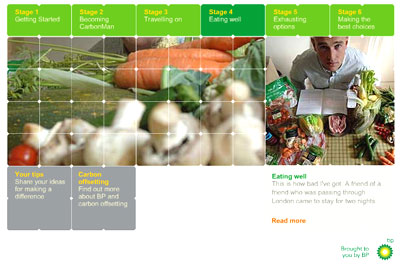
Published on Guardian Unlimited
THIS IS HOW BAD I'VE GOT. A friend of a friend who was passing through London came to stay for two nights. On the first evening I went out to get a bottle of wine while she kindly cooked dinner. I came back to a boiling house, lights blazing and CD raging.
"Sorry," she said through the steam, "I thought I was turning them off but put all the rings on six!" The oven was on full to heat a couple of plates, and she was doing the washing up by running the hot tap and rinsing everything underneath - water is heated by gas, wasting hot water wastes gas, wasting gas increases my carbon footprint.
"Here, let me wash up," I said, panicking at the sight of it all, and thinking "Put the plug in NOW! Step away from the sink!"
"No, no, no, I won't hear of it," she said, laughing at how cleverly domesticated she was being. After dinner she went for "a long hot bath" - arrggh! - and finally I managed to get the cooker switched off at the wall - that little red glow really bugs me nowadays.
I started out on this project promising myself not to get all hair-shirty about it. But now I - seriously - find myself counting the seconds it takes to fill the kettle with one or two cups of water so as not to boil too much. (It's three seconds a mug).
The kitchen is the worst place for all this. Not only do I (still) have stupid spotlights burning away at 50W each, but there's a kettle, toaster, microwave, blender, electric oven, grill, hob, gas boiler and a big buzzing fridge freezer. Everything else can be switched off, but the fridge? No.
I get some respite from the fact that my electricity is wind-powered, but even that is tinged with guilt. Yes, the energy might profess to be "green" but really it's "brown" - I'm still on the grid and any energy I use that the windmills can't supply is bought from a coal-fired power station. The only thing to do is reduce use as much as possible.
But it is what is inside the fridge that really takes the biscuit - everything seems to have been specially flown in. I did an experiment for this diary. I prepared two meals from similar produce. One lot of food came from Asda, the other from organic food suppliers Abel and Cole. Asda is planet-sized, Abel and Cole a small business run from Wimbledon in London.
My Asda shopping basket looked like this:
Cherry tomatoes from Morocco, Bananas from Cameroon Mixed bag of cut and washed carrots, broccoli and cauliflower from "various countries" Mangetout and asparagus tips from Peru Babycorn from Thailand Wild rocket from "more than one country" Trimmed green beans from Kenya Lamb chops from New Zealand Rosé wine from Australia.
All up this stuff came from at least four continents, more or less eight countries, was thoroughly wrapped in plastic and cost £15.
And in the green corner, my organic basket looked like this:
Mushrooms Leeks Carrots Courgettes Corn on the cob Runner beans Celery bunches Cauliflower English lamb Pebblebed rosé wine from Devon Rocket and cherry tomatoes from the garden
This lot was all British, organic and came from places like "Blaencamel Farm, Lampeter" or "Sunnyfields, Southampton. It came unwrapped in a cardboard box, delivered to the door by a diesel van (they are converting to bio-fuels soon) and - here's the rub - cost £25 (although there was more of it, too). The Devon wine cost £10, the Aussie bottle £3. Did the food taste any different? Of course it did - the fresh UK stuff was better by a mile, said my cousin who was roped in for blind tasting. The best thing were the cherry tomatoes from the garden.
But what about the carbon? Well, it's hard to tell the carbon footprint of food, but we can work out the food miles. Using the AA's online distance calculator, I reckon the Abel and Cole produce had travelled about 2,000km in total to reach my kitchen. And working with the Times Atlas of the World to assess the Asda basket, I discover it's a whopping 83,900km (nearly three times round the world), capital city to capital city. So about 40 times as far, and in a plane. Plus, I'm more likely to have to drive to the supermarket, increasing my carbon footprint. Walking into the garden to pick fresh vegetables keeps me off the roads.
Getting rid of the waste packaging also has to be taken into account, and don't start thinking about other concerns, like pesticide use, or the labour conditions of the workers in the country of origin. All we know about the supermarket stuff is it came from a place called Asda.
My point is? Buy British, buy local, buy in season, grow a bit yourself ("rocket comes up in April and lasts through October" a colleague told me, "I put some on my sandwiches every day"), ignore Peruvian asparagus/Kenyan beans/Thai babycorn/anything flown in, eat less meat, and - if you can - sign up to a organic vegetable box scheme, they're actually really good.
Excuse me, I've got to go and scratch - this shirt is killing me.
Websites I have been on this week
www.abel-cole.co.uk
www.soilassociation.org








0 comments:
Post a Comment